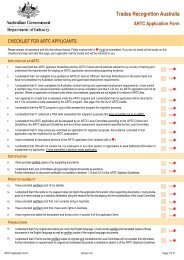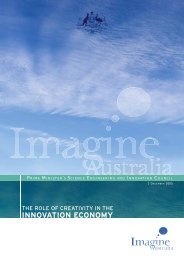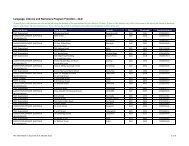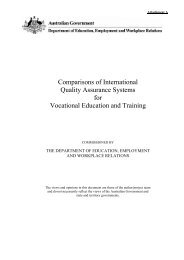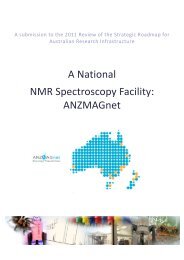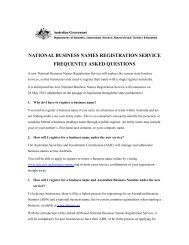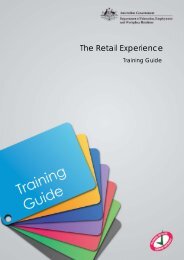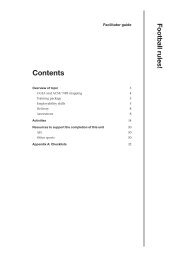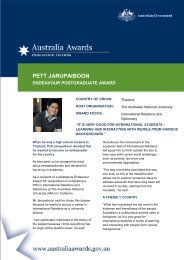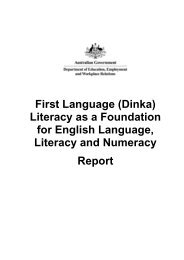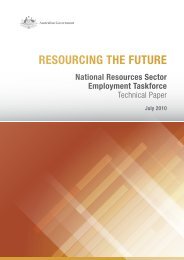Epidemics in a Changing World - Department of Innovation, Industry ...
Epidemics in a Changing World - Department of Innovation, Industry ...
Epidemics in a Changing World - Department of Innovation, Industry ...
You also want an ePaper? Increase the reach of your titles
YUMPU automatically turns print PDFs into web optimized ePapers that Google loves.
While we do have systems for coord<strong>in</strong>ation, surveillance, surge response, and <strong>in</strong>tervention,<br />
we have been fortunate that:<br />
• we have not had more epidemic emerg<strong>in</strong>g <strong>in</strong>fectious diseases to deal with<br />
• we have not had to deal with a highly transmissible and lethal emerg<strong>in</strong>g <strong>in</strong>fectious<br />
disease yet<br />
EpidemICs <strong>in</strong> a Chang<strong>in</strong>g <strong>World</strong><br />
Report <strong>of</strong> the Expert Work<strong>in</strong>g Group<br />
18<br />
• we have not had to deal with a susta<strong>in</strong>ed outbreak <strong>of</strong> such an emerg<strong>in</strong>g <strong>in</strong>fectious diseases<br />
(i.e. one last<strong>in</strong>g months to years).<br />
While it is recognised that as a small nation we are unable to cover the full range <strong>of</strong> expertise<br />
<strong>in</strong> all fields, we need to have sufficient capacity to provide flexibility <strong>in</strong> our preparedness for<br />
deal<strong>in</strong>g with epidemic diseases.<br />
Furthermore, we need to possess expertise at the highest <strong>in</strong>ternational level <strong>in</strong> many areas <strong>in</strong><br />
order to provide a tradeable knowledge base that will allow access to overseas expertise. An<br />
example is the earlier strong research pr<strong>of</strong>ile <strong>in</strong> virology that allowed Australia to become a<br />
major <strong>in</strong>ternational contributor <strong>in</strong> the times <strong>of</strong> Burnet, Ada, and Fenner. However, while there<br />
are isolated current pockets <strong>of</strong> strength, we are los<strong>in</strong>g our expertise <strong>in</strong> this critical discipl<strong>in</strong>e.<br />
Critically, we need active ongo<strong>in</strong>g monitor<strong>in</strong>g <strong>of</strong> the demand and supply <strong>of</strong> essential epidemicrelevant<br />
expertise, <strong>in</strong> order to respond to the chang<strong>in</strong>g global environment. Currently,<br />
<strong>in</strong>dependent ad hoc decisions by authorities, government agencies and educational <strong>in</strong>stitutions<br />
may cause un<strong>in</strong>tentional shortfalls <strong>in</strong> the breadth, depth and availability <strong>of</strong> essential expertise <strong>in</strong><br />
Australia. National workforce plann<strong>in</strong>g is required for this critical field, encompass<strong>in</strong>g the many<br />
discipl<strong>in</strong>es required.<br />
A recent report 61 outl<strong>in</strong>ed gaps <strong>in</strong> the age<strong>in</strong>g cohort <strong>of</strong> Australian taxonomists. Of particular<br />
relevance to this work is the potential shortage <strong>of</strong> entomological taxonomists; these specialists<br />
are at the front l<strong>in</strong>e <strong>in</strong> the identification <strong>of</strong> potential disease vectors. One example <strong>of</strong> our<br />
vulnerability <strong>in</strong> the area <strong>of</strong> entomology is our reliance on overseas expertise on midges – the<br />
vector for bluetongue viruses. One <strong>of</strong> two Australian midge experts died dur<strong>in</strong>g the course <strong>of</strong><br />
compil<strong>in</strong>g this Expert Work<strong>in</strong>g Group Report, and the other is retired (aged 81). Australia has<br />
limited domestic capacity to fill the gap when this expertise is no longer available.<br />
Another example is the recognised Australian shortage <strong>of</strong> animal health specialists. Diagnosis<br />
and management <strong>of</strong> animal disease requires a wide range <strong>of</strong> expertise, <strong>in</strong>clud<strong>in</strong>g pathology,<br />
virology, and bacteriology; anticipated Australian shortages <strong>in</strong> the relevant discipl<strong>in</strong>es have<br />
been clearly identified. 62<br />
Recommendation 1<br />
In order to underp<strong>in</strong> our preparedness to deal with emerg<strong>in</strong>g epidemic diseases we<br />
recommend that:<br />
Australia possesses the human capacity to combat potential epidemics<br />
The nation must be prepared and sufficiently agile to deal with unexpected epidemics.<br />
This requires that we develop, ma<strong>in</strong>ta<strong>in</strong> and reta<strong>in</strong> skilled people through:<br />
• conduct<strong>in</strong>g ongo<strong>in</strong>g national workforce plann<strong>in</strong>g for expertise <strong>in</strong> human and animal<br />
epidemic diseases; and<br />
• boost<strong>in</strong>g higher education and research tra<strong>in</strong><strong>in</strong>g <strong>in</strong> areas <strong>of</strong> need.



